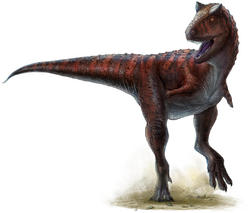Biology:Furileusauria
| Furileusaurians | |
|---|---|

| |
| Restoration of a sprinting Carnotaurus sastrei | |
| Scientific classification | |
| Domain: | Eukaryota |
| Kingdom: | Animalia |
| Phylum: | Chordata |
| Clade: | Dinosauria |
| Clade: | Saurischia |
| Clade: | Theropoda |
| Family: | †Abelisauridae |
| Clade: | †Brachyrostra |
| Clade: | †Furileusauria Filippi et al., 2016 |
| Genera | |
| |
Furileusauria ("stiff back lizards") is an extinct clade of derived abelisaurid dinosaurs only known from South American fossil remains.[1] They represent some of the largest members of the Abelisauridae, with an average length of 7.1 ± 2.1 m (23.3 ± 6.9 ft).[2] The clade is defined as the most inclusive clade containing Carnotaurus sastrei but not Ilokelesia aguadagrandensis, Skorpiovenator bustingorryi, or Majungasaurus crenatissimus.[1]
Classification
Distinguishing traits
Furileusauria is distinguished by several traits exclusive to the members of this clade. These are:[1]
- the presence of a tip in the middle area of the posterior surface of the ventral process of the postorbital
- the presence of a knob followed by a deep notch in the postorbital-squamosal contact
- the absence of fenestra between the frontal, postorbital and lacrimal
- an anterior projection of the distal end of the cervical epiphophyses
- the posterior margin of the postzygapophyses at level with the intervertebral articulation in dorsal vertebrae
- a crescent-shaped morphology of the distal tip of the transverse processes in anterior and middle caudal vertebrae
- the transverse processes of anterior caudal vertebrae distally expanded and only anteriorly projected
- a convex external margin of the transverse processes in anterior caudal vertebrae
- cnemial crest of the tibia with a downturned process
Phylogeny
In the description of the abelisaurid Llukalkan, the authors performed a phylogenetic analysis to test the affinities of the new taxon. The simplified strict consensus tree of the analysis is shown below.[3]
| Abelisauridae |
| ||||||||||||||||||||||||||||||||||||||||||||||||||||||||||||||||||||||||||||||||||||||||||||||||||||||
See also
References
- ↑ 1.0 1.1 1.2 Filippi, Leonardo S.; Méndez, Ariel H.; Juárez Valieri, Rubén D.; Garrido, Alberto C. (2016-06-01). "A new brachyrostran with hypertrophied axial structures reveals an unexpected radiation of latest Cretaceous abelisaurids" (in en). Cretaceous Research 61: 209–219. doi:10.1016/j.cretres.2015.12.018. ISSN 0195-6671. https://corporate.exxonmobil.com/-/media/Global/Files/locations/Argentina-operations/Cretaceous-research.pdf.
- ↑ Grillo, Orlando Nelson; Delcourt, Rafael (2017-01-01). "Allometry and body length of abelisauroid theropods: Pycnonemosaurus nevesi is the new king" (in en). Cretaceous Research 69: 71–89. doi:10.1016/j.cretres.2016.09.001. ISSN 0195-6671.
- ↑ Gianechini, Federico A.; Méndez, Ariel H.; Filippi, Leonardo S.; Paulina-Carabajal, Ariana; Juárez-Valieri, Rubén D.; Garrido, Alberto C. (2021). "A New Furileusaurian Abelisaurid from La Invernada (Upper Cretaceous, Santonian, Bajo De La Carpa Formation), Northern Patagonia, Argentina.". Journal of Vertebrate Paleontology: e1877151. doi:10.1080/02724634.2020.1877151.
Wikidata ☰ Q33862601 entry
 |

